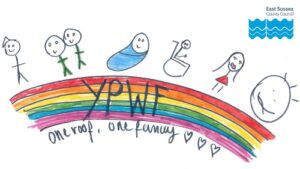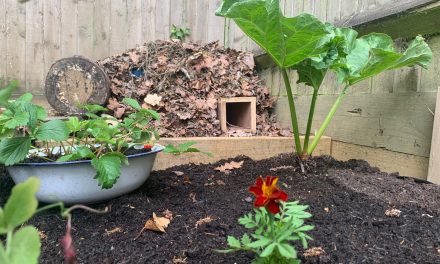You’ve been thinking about becoming a foster carer for a while, maybe even years (it takes an average of three years before applying). It’s a huge decision, life-changing for you and those around you. Of course the lives you’ll be really changing are those of the children and young people you’ll be welcoming into your home… but what would your children make of having new foster-siblings?

There are very few reasons why you couldn’t foster if you’ve got ‘time to care and room to share’. A common concern is what your own children might think about welcoming a foster child into their life. It’s not going to be an easy ride every single day, some days will be challenging, but some days are brilliant too. Without talking to your children, you’ll never know what their reaction would be. I recently spoke to Alia (17) and Mya (15), about their fostering journey. They are children of foster carers who have been fostering for several years. Their words of wisdom might help start the conversation in your home…
It’s that time of year
We talked about celebrating ‘Children of Foster Carer’s Month’ in October and how November saw the festive TV ads emerging. The girls fondly recalled one called ‘The Beginner’ about a foster carer learning to skateboard. We acknowledged that when people feel Christmassy, we get warm and fuzzy feelings of contentment and excitement. Sometimes that reminds us that not everyone has what we have. So how did they feel when fostering began for them?
Let’s have a chat about fostering
“Our parents sat us down, they were like, we’ve been thinking about fostering, we’ve had a phone call to find out more about it and we’re wondering what your thoughts are?” the girls recall. They were 9 and 12 years old back then and were given time to think about this and ask questions. On a family trip abroad they’d met a little girl who, in the UK, might have been fostered. This prompted their parents, already been thinking about fostering, to take the next step and enquire.
“We felt lucky and we did want to give back to the community, that was my idea on it”, Alia remembers. The girls hadn’t really known what foster care was, but they were aware that not everyone’s home life was the same as theirs and that some children might have to move out of their family homes. Mya was younger: “I was quite excited. I was only in year four, I’d have someone else to play with”.
…and so it began
It usually takes four to six months to be assessed to become a foster carer. There are some checks to be carried out, and the fostering team along with some experienced foster carers, support you through the whole process. The girls remember the first home visit from the fostering team, and even the name of the social worker (Tina) they all met at the start of the family assessment. They’ve met up with her several times over the years at the annual picnics and other organised social events.
Alia remembers: “We had to change the house a bit, so then it got real and we were a bit nervous wondering what to expect – and I still have that sometimes whenever there’s a new child coming because you never really know what it will be like…”
“…after a child comes, we’re asked to do little reviews of how it’s going for us. It always goes well, but it just wasn’t what I expected. It was exciting, and the pros definitely outweigh the cons”.
 “I’m the younger one, they’ve all been younger than us” says Mya, “that’s what our parents thought would work. I’m seen as the playmate, I don’t need to guide them, I just try to get to know each other by playing little games, that’s my role I guess. You make memories with them and yeah, it can be really nice on both sides”.
“I’m the younger one, they’ve all been younger than us” says Mya, “that’s what our parents thought would work. I’m seen as the playmate, I don’t need to guide them, I just try to get to know each other by playing little games, that’s my role I guess. You make memories with them and yeah, it can be really nice on both sides”.
“When you’re having a lot of fun with them, and see they’re having fun as well, it’s a special moment to experience that, because they wouldn’t have felt like that most of the time in their own home”.
It’s your choice
As a foster carer, you can state your preference of the age range of children you think you’d like to foster. This can change over time and with experience. Pre-school children will be with you all day, and they can’t always tell you what they’re feeling. Teenagers are more independent, making it easier for you to work alongside fostering, and they can communicate far better, if they want to! Your life skills and personal situation may influence your preferences. “If they’re old enough to talk, we play and try to get them to laugh and ask simple things like ‘what’s your favourite food?’ and ‘what’s your favourite colour?’ Or we just hang out, I love being part of that”, the girls’ smiles are beaming as we continue our video call for this interview.
Managing practical and emotional experiences
The training that foster carers and their families receive has helped the girls understand the reasons that cause another child to behave in a certain way. They have been times when a foster child was ‘challenging’ for a long period of time which took up a lot of their parents’ attention, and stress levels were a bit higher at the end of the day.
“That’s probably the hardest bit for me,” says Mya.

“I will always say the hardest bit is when they leave” says Alia, “you do get close to the kids, and it breaks your heart all the time, but to know you helped them when they needed it is kind of amazing too”.
Their school friends are unfazed by what they do and just say “oh ok” if they see another child on the school run. “When I had my GCSE’s we had to work together as a family so I had my space and I could revise, and I got good grades! If our parents are busy in the day, we talk in the evenings and make sure I was alright too, it’s just about managing things”.

Young People Who Foster Council (YPWF) ‘get it’
East Sussex County Council’s fostering service have a team of specialists who work to support a wonderful group, called the YPWF Council. It offers your own children a space to talk with people who really ‘get it’.
Alia recalls: “We were there from the start, the very first Council meeting about five years ago. The things we do there are really nice, days out and also times when we get together to talk about how everyone deals with stuff. We all got quite close, it’s fun and good to be together because people in your everyday life don’t understand fostering”
Mya remembers loving all the activities, and also being able to recommend things to help prepare young people whose family are going to start fostering.
Alia and Mya’s advice (because we’ve lived it and love it)
- If you really have a feeling that you want to foster, don’t stop just in case this or that might happen, because there’s always going to be a solution to things.
- Stuff happens and you get through it as a family. You’re still the same family, you just also foster. People are like ‘oh that’s such a good thing you’re doing’, I think they’re interested in it.
- It’s one of the most important things you might ever do, to get to make a positive change in someone’s life and create some happiness is worth every small struggle, I mean what job is more rewarding?
- Make sure you communicate with your parents, if you feel like you’re not getting enough attention, there’s going to be a solution.
Alia is interested in psychology and wants to do a social work degree. She will include the fact that she has had a role in a fostering family in her personal statement when she applies to university. Both she and Mya are proud of the unique welcome they’ve been able to give to vulnerable children in their home, they’re proud of their parents too. We hope their story helps break down at least one barrier to fostering because there is a national shortage of foster carers. East Sussex needs more foster carers now.
Find out more about fostering for East Sussex County Council
Contact the fostering team online, join one of our virtual information sessions, or give us a call on 01323 464129 whether fostering is right for you now, or maybe in the future. It’s never to soon to start your research, ask about training, support, allowances and preferences. It’s okay to ask about the money you’ll be paid to care for a young person… very few foster carers do this work for the money, but they can’t foster without it.




